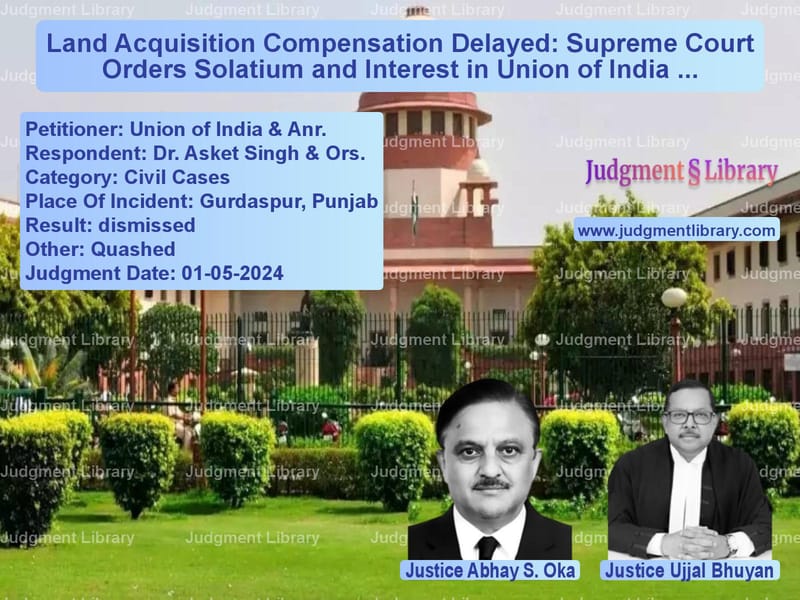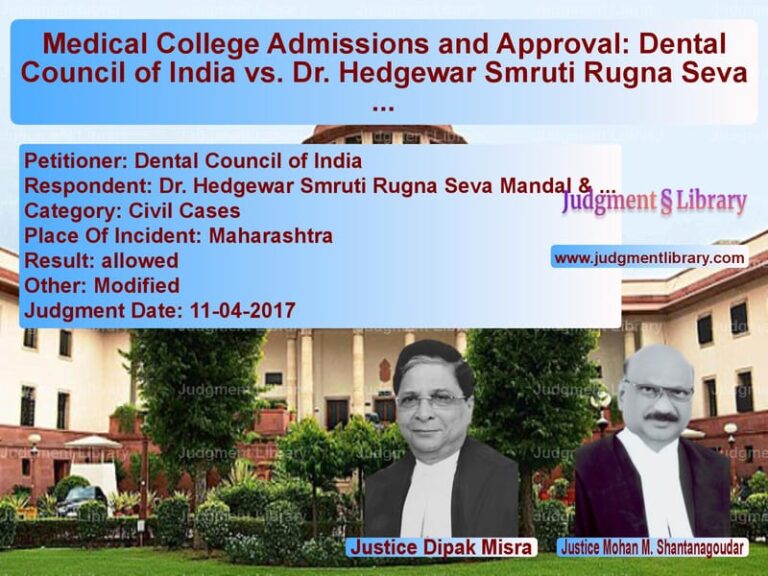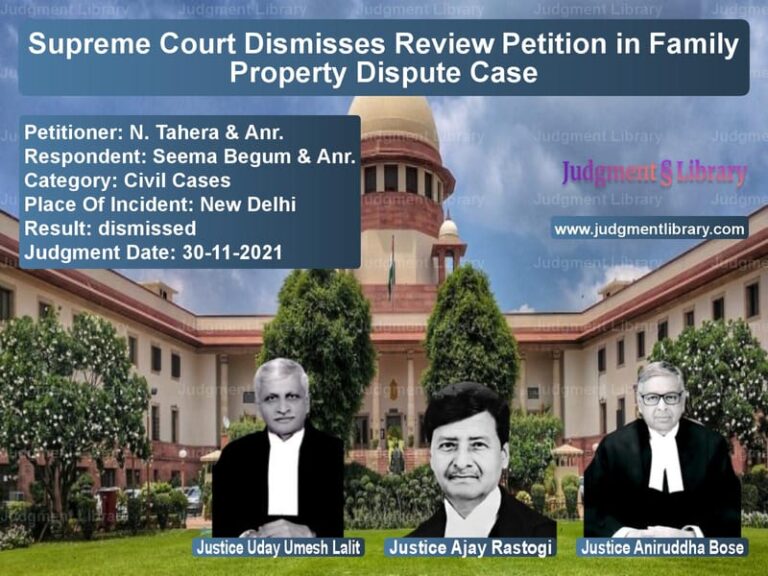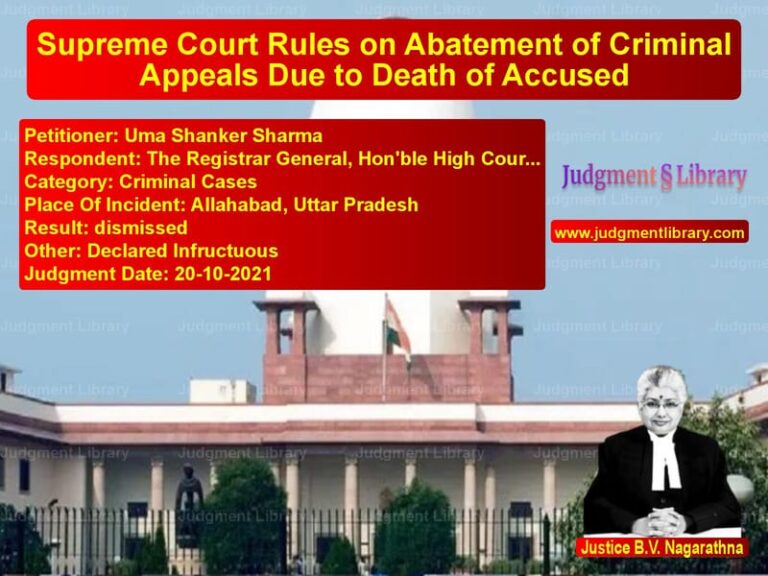Land Acquisition Compensation Delayed: Supreme Court Orders Solatium and Interest in Union of India vs. Dr. Asket Singh
The case of Union of India & Anr. vs. Dr. Asket Singh & Ors. deals with the prolonged delay in payment of compensation for land acquisition under the Requisitioning and Acquisition of Immovable Property Act, 1952 (hereinafter referred to as the ‘1952 Act’). The Supreme Court of India upheld the decision of the High Court, directing the government to pay solatium and interest due to the extraordinary delay in the payment of compensation. The judgment underscores the constitutional obligation of the state to ensure fair compensation within a reasonable timeframe.
The case highlights the principles of Article 14 (Right to Equality) and Article 300A (Right to Property) of the Indian Constitution. The Supreme Court firmly ruled that compensation must be paid within a reasonable period and that inordinate delays violate constitutional and legal principles.
Background of the Case
The respondents, Dr. Asket Singh & Ors., were landowners whose property was acquired by the Ministry of Defence under the 1952 Act. The key events in this prolonged legal battle are as follows:
- March 26, 1964: A notice of acquisition was issued under Section 7 of the 1952 Act.
- April 3, 1964: The notice was published in the official gazette, completing the vesting of the land with the government.
- August 16, 1976: An offer for compensation was made—12 years after the acquisition.
- October 8, 1976: The landowners rejected the offer, leading to the appointment of an arbitrator.
- May 8, 1998: The arbitrator determined the market value at Rs. 150 per Marla, but this was challenged in court.
- High Court Ruling: The High Court revised the compensation to Rs. 350 per Marla and awarded solatium and interest due to the delay.
- Appeal in Supreme Court: The Union of India challenged the High Court’s decision, arguing that solatium and interest should not be awarded under the 1952 Act.
Key Legal Issues
The core issues before the Supreme Court were:
- Whether the delay in paying compensation justified the award of solatium and interest.
- Whether the 1952 Act allows for such additional payments in the absence of explicit provisions.
- Whether the delay violated the constitutional rights of the landowners under Article 14 and Article 300A.
Arguments by the Appellants (Union of India)
The Union of India raised the following contentions:
- The 1952 Act does not provide for solatium or interest, and granting such relief would be beyond the statutory framework.
- The delay in resolving the compensation was primarily due to procedural complexities and not deliberate negligence.
- The government had acted in good faith, and any compensation awarded should be limited to the arbitrator’s determination.
Arguments by the Respondents (Landowners)
The landowners countered with the following arguments:
- The government took 12 years just to make an offer for compensation, and another 20 years for the arbitration to conclude—an unreasonable and arbitrary delay.
- The High Court correctly ruled that such a delay violates Article 14, as it is arbitrary and unfair.
- Compensation is a constitutional right under Article 300A, and delayed payments erode the value of the awarded amount.
- The Supreme Court has previously granted solatium and interest in cases where compensation was unjustly delayed.
Supreme Court’s Judgment
The Supreme Court ruled in favor of the landowners, dismissing the appeal filed by the Union of India. The key observations of the Court were:
“Considering the huge delay involved in payment of compensation, the High Court has rightly granted solatium and interest in terms of the decisions of this Court. In fact, we are surprised to note that the appellants have dragged the first respondent to this Court. There is absolutely no merit in these appeals.”
The Court highlighted several important legal principles:
- Violation of Constitutional Rights: The delay of over 30 years in awarding compensation was held to be a violation of Article 14 (Right to Equality) and Article 300A (Right to Property).
- Precedent in Similar Cases: The Court relied on previous judgments, including Harbans Singh Shanni Devi v. Union of India, Union of India v. Chajju Ram, and Dilawar Singh & Ors. v. Union of India & Ors., where solatium and interest were granted due to excessive delays.
- State’s Obligation to Pay Timely Compensation: The Court emphasized that compensation must be paid within a reasonable timeframe and that undue delays amount to arbitrariness, violating fundamental rights.
Legal Precedents Considered
The Supreme Court referred to several cases that established the principles of fair compensation:
- Harbans Singh Shanni Devi v. Union of India: Established that solatium and interest must be awarded in cases of extraordinary delay.
- Union of India v. Chajju Ram: Reinforced the principle that landowners should not suffer due to bureaucratic inefficiency.
- Dilawar Singh & Ors. v. Union of India & Ors.: Held that compensation should be adjusted for inflation and delay.
Conclusion
The Supreme Court’s judgment in Union of India & Anr. vs. Dr. Asket Singh & Ors. is a significant ruling reinforcing the government’s obligation to pay fair compensation within a reasonable period. The ruling emphasizes that:
- Delays in compensation payments are unconstitutional.
- Solatium and interest can be granted even if not explicitly provided for in the statute.
- The state must act in a fair and just manner while acquiring private property.
The case serves as an important precedent for land acquisition matters, ensuring that property owners are not left waiting for decades to receive what is rightfully theirs.
Petitioner Name: Union of India & Anr..Respondent Name: Dr. Asket Singh & Ors..Judgment By: Justice Abhay S. Oka, Justice Ujjal Bhuyan.Place Of Incident: Gurdaspur, Punjab.Judgment Date: 01-05-2024.
Don’t miss out on the full details! Download the complete judgment in PDF format below and gain valuable insights instantly!
Download Judgment: union-of-india-&-anr-vs-dr.-asket-singh-&-or-supreme-court-of-india-judgment-dated-01-05-2024.pdf
Directly Download Judgment: Directly download this Judgment
See all petitions in Property Disputes
See all petitions in Damages and Compensation
See all petitions in Judgment by Abhay S. Oka
See all petitions in Judgment by Ujjal Bhuyan
See all petitions in dismissed
See all petitions in Quashed
See all petitions in supreme court of India judgments May 2024
See all petitions in 2024 judgments
See all posts in Civil Cases Category
See all allowed petitions in Civil Cases Category
See all Dismissed petitions in Civil Cases Category
See all partially allowed petitions in Civil Cases Category







